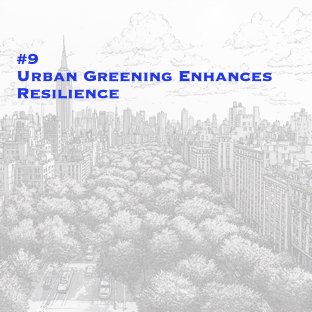From Pavement to Paradise: Why Paris's Bold Move to Green Its Streets Just Makes Sense.
Paris is leaping into the future with its new Climate Plan for 2024-2030, and it should transform how we think about how we live in cities. I walk down the roads in central Austin and I now wonder when aren't cities in the US doing what Paris has chosen to do? Paris has made the decision to replace parking spaces with tree-lined paths as not just a nice-to-have, but a must-do. All that gray will be turned to green and it will make the city a more community-oriented, resilient, and sustainable city. Chicago has over 35,000 metered parking spaces/lots, underscoring the magnitude of the city's parking footprint (Chicago DOT). That is a problem.
Parking lots represent an outdated vision of the city and are, frankly, an eyesore. They are a symbol of automobile dominance, convenience at the expense of livability, and the prioritization of vehicles over people. It's great to see a city like Paris flipping this script, recognizing that cities are, and should always be, built for people first. Converting parking spots into green pathways is much more than aesthetic improvement; it's a redesign for a much much healthier future for the people. Walking past lush green trees instead of rows of idle cars allows Paris (and any city that can do the same) to tackle both the challenges of climate adaptation and social well-being.
Planting trees and greenery isn't just for show. The benefits go beyond making neighborhoods look picturesque. Urban greenery mitigates the impacts of climate change by creating microclimates that cool down neighborhoods – something especially critical in our cities. Trees act like natural air conditioners, providing shade, absorbing heat, and reducing the urban heat island effect. As our summers get hotter, shaded pathways make it possible for city dwellers to comfortably navigate their city. This is the basis of one of the 21 Laws of Cities: Law #9 being Urban Greening Enhances Resilience.
Beyond climate, trees make our neighborhoods more vibrant and, crucially, more connected. They create spaces where people meet, walk, relax, and take time for themselves. Jane Jacobs preached this. Reza and I (cohosts on the Future Forward podcast, https://futureforward.fm/) offer up a law that highlights this; Law #8: Public Spaces Foster Social Cohesion.
Tree-lined streets increase foot traffic to local businesses, support mental health, and make streets more inviting. Paris's plan ties directly into the growing realization that our cities are the sum of our 'micro-interactions'. Streets lined with cars are designed for individuals in isolation, but streets lined with trees are built for communities. The vision of Paris isn't just to reduce emissions; it is to create spaces where people want to live, connect, and thrive.
But the value of reimagining parking spaces isn't just about greenery – it's about shifting priorities. Cities worldwide face the same question: what is important? Is it the car owner looking for a convenient spot, or is it the child who wants a safe route to walk to school? Paris is choosing the latter. It is choosing greenery over asphalt, community over congestion, and long-term livability over short-term convenience. This is urban resilience in practice – creating spaces that adapt, endure, and bring value to everyone who lives in them.
This transformation might seem bold, but it's so simple and necessary. We know that cities that invest in their green spaces reap the benefits through increased social cohesion, improved public health, and a more robust climate response. Paris is setting an example for other cities to follow, not by making empty pledges but by implementing concrete, visible actions. As cities around the world struggle to define what "climate adaptation" actually looks like, Paris is showing that it can be as simple as planting more trees and reducing the space we allocate to cars.
The movement to reclaim urban space for people instead of vehicles is gaining momentum globally, and Paris is at the forefront of this new urban revolution. We really do not have a choice.




